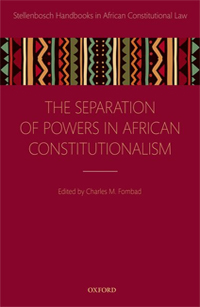Edited by Charles M. Fombad
2016
ISBN: 9780198759799
About the publication
The new series Stellenbosch Handbooks in African Constitutional Law will engage with contemporary issues of constitutionalism in Africa, filling a notable gap in African comparative constitutional law. Separation of Powers in African Constitutionalism is the first in the series, examining one of the critical measures introduced by African constitutional designers in their attempts to entrench an ethos of constitutionalism on the continent.
Taking a critical look at the different ways in which attempts have been made to separate the different branches of government, the Handbook examines the impact this is having on transparent and accountable governance. Beginning with an overview of constitutionalism in Africa and the different influences on modern African constitutional developments, it looks at the relationship between the legislature and the executive as well as the relationship between the judiciary and the political branches. Despite differences in approaches between the different constitutional cultures that have influenced developments in Africa, there remain common problems. One of these problems is the constant friction in the relationship between the three branches and the resurgent threats of authoritarianism which clearly suggest that there remain serious problems in both constitutional design and implementation. The book also studies the increasing role being played by independent constitutional institutions and how they complement the checks and balances associated with the traditional three branches of government.
Table of contents
General Introduction, James Fowkes and Charles M. Fombad
- Part I: Overview
The evolution of modern African constitutions: A retrospective perspective
Charles M. Fombad - An overview of the separation of powers under modern African constitutions
Charles M. Fombad
Part II: The Relationship between the Legislature and the Executive - Parliamentary sovereignty or presidential imperialism? The difficulties of identifying the source of constitutional power from the interaction between legislatures and executives in Anglophone Africa,
Francois Venter - The context of Kenya's budding bicameralism and legislative-executive relations,
Conrad Bosire - Legislative-executive relations in presidential democracies: The case of Nigeria,
Sylvester Shikyil
Part III: The Relationship between the Judiciary and the Political Branches - An overview of judicial and executive relations in Lusophone Africa
Fernando Bastos - Re-imagining judicial/executive relationships and their future in Africa
James Fowkes - Super-presidentialism in Angola and the Angolan judiciary
Andre Thomashaussen - An overview of approaches to judicial and executive relations: Case study on Ghana
Kofi Quashigah - Judicial/executive relations in Nigeria's constitutional development: Clear patterns or confusing signals?
Ameze Guobadia - Relations between the legislature and the judiciary in Ethiopia
Assefa Fiseha - Separation of powers in judicial enforcement of governmental ethics in Kenya and South Africa
Walter Ochieng - Judicial and executive relations in Namibia: A review of four cases
Nico Horn
Part IV: Independent Constitutional Institutions - The role of emerging hybrid institutions of accountability in the separation of powers scheme in Africa
Charles M. Fombad - The public prosecutor in the Commonwealth: Separation of powers and the rule of law
Jeffrey Jowell - Separation of powers and the role of the public prosecutor in Francophone Africa
Horace Adjolohoun and Charles M. Fombad
Conclusion,
Michaela Hailbronner

